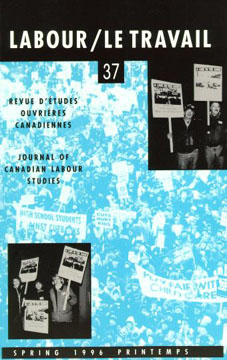Abstract
At the turn of the century, the legislative, administrative, and judicial branches of the Canadian state responded to the labour conflicts associated with the second industrial revolution by simultaneously expanding both their coercive and their facilitative roles. This paper examines one aspect of this development, the rise of the labour injunction, through a study of a series of strikes conducted chiefly by metal workers in south central Ontario between 1900 and 1914. In addition to retrieving the largely forgotten genealogy of a body of law that continues to play an important role in regulating and containing trade union activity, the study contributes insights into debates raging among labour historians regarding the role and significance of state institutions and public discourse in determining the trajectory and fate of organized labour.
Résumés
Vers la fin du siècle dernier, les agences législatives, administratives et judiciaires de l'Etat canadien ont réagi aux conflits de travail associés à la seconde révolution industrielle, par l'expansion simultanée de leurs rôles coercitifs et positifs. L'article examine l'un des aspects de ce développement, notamment, la multiplication des injonctions, à l'aide d'une étude concentrée sur une série de grèves dirigées par les métallurgistes dans le centre-sud de l'Ontario entre 1900 et 1914.
En plus de retrouver la généalogie oubliée d'un corps législatif qui continue de jouer un rôle important dans le règlement et l'encadrement des activités des syndicats, l'étude est très intuitive concernant les débats qui existent entre les historiens au sujet du rôle et de l'importance des institutions d'Etat, ainsi que du discours public afin de déterminer la trajectoire et le destin du travail organisé.
